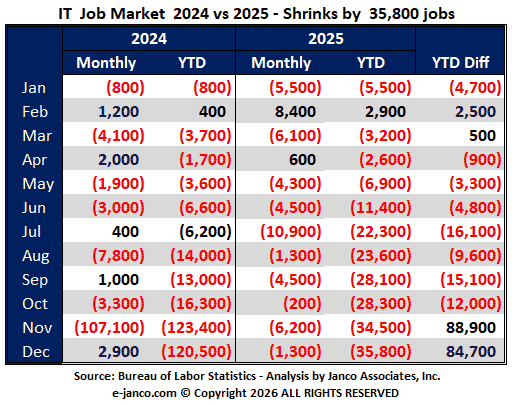IT Salaries Fall As New IT Jobs Scarce
IT Salaries Fall As New IT Jobs Scarce - After years of unrestrained growth, compensation for information technology (IT) workers declined in the first half of this year, according to the latest installment of a salary study released today.
The study, an international consulting organization based in Park City, Utah, found the average yearly compensation package - including bonuses, stock options and fringe benefits - for IT personnel at medium-sized companies shrank from $113,224 to $110,578.
At large companies, total compensation packages dipped slightly from $108,963 to $108,275, the study said.
M. Victor Janulaitis, CEO of Janco Associates, said the company has tracked IT salaries every six months since 1983, and the period of January to May 2001 marks the first time since 1985 that there has been a decrease in the salary paid to top performers. He called the findings "startling. "
"The most important thing to note is we finally have reached a trend," said Janulaitis. "For the first time in a long time, IT salaries did not continue to escalate at an ever-increasing rate. In the 1990 recession, they slowed but did not decline. "
Part of the decline can be blamed on a significant drop in the value of most companies' stock options, Janulaitis said. However, there are more factors at work and some might cause more problems in the future.
"Last year at this time, an IT professional could find a new job and get a 10 percent to 20 percent increase, mostly through performance bonuses or stock. Now, dot-com companies are closing, meaning more people are looking for fewer jobs," he said. "The dot-com phenomenon has gone through to IT, and has had a real impact. "

Latest YTD IT job market data - Subscribe to our Newsletter to get this information delivered to your inbox as soon as it is released. SUBSCRIBE
Janulaitis predicted that the economy will remain slow for the near future, causing companies to continue tightening their belts for the next two to three quarters. He said the fallout from the energy crisis that has plagued California and threatens other states has not finished.
"For the first time, we are seeing massive layoffs as companies shift IT functions out of house," he said.
Another factor driving salaries down is the loss of jobs formerly filled by holders of "H-1B" visas in the United States. According to Janulaitis, foreign nationals could apply for these visas if a company could show that no U.S. national could do the job and it was a highly paid position. He said this created a "subset of high-paying jobs" that no longer are cost-effective for companies to continue.
H-1B visas are six-year temporary worker permits that allow foreign nationals to secure employment in the U.S. in eligible firms that pay the U.S. government, in addition to the employees. The government has issued 117,000 H-1B visas this year, continuing to ratchet up the number made available each year after Congress passed laws allowing the near-doubling in the wake of the IT industry's clamoring for foreign help.
The IT professionals most likely to hold onto their jobs are those who increase revenue or reduce risk, said Janulaitis. He said people who know how to manage e-commerce and process orders on line fit the first category, and security experts fit the latter.
"The infrastructure positions, the ones companies regard as overhead, are the positions in the most danger," he said.
However, because of the economic downturn and dot-com fallout, the supply of senior technology executives is now outstripping demand in North America. As a result, the "total packages for CIOs will remain flat or go down until the end of 2001," says Janulaitis.
Order Salary Survey Download Sample Provide Data


